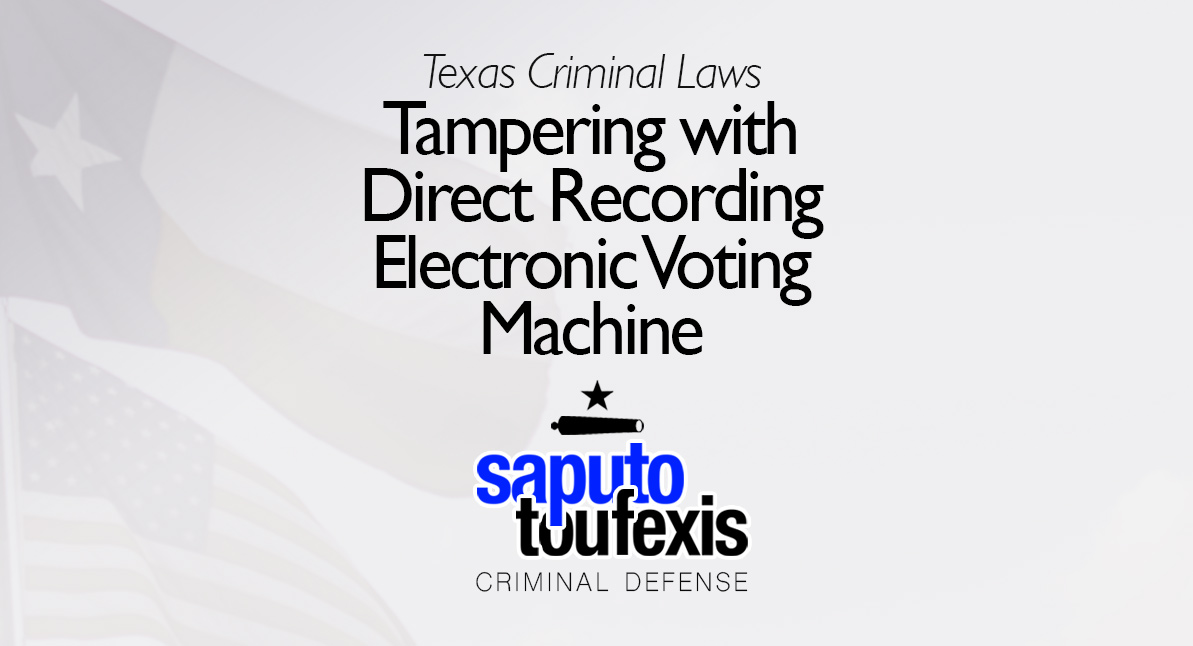The Texas Tampering with Direct Recording Electronic Voting Machine law gives police the right to arrest you if they believe you accessed any part of an electronic voting system and tampered with it in one of four specified ways that affect votes.
FAQs about the
Tampering with Direct Recording Electronic Voting Machine law in Texas
- What is the current Texas law about Tampering with Direct Recording Electronic Voting Machine?
- How can I be charged with a Tampering with Direct Recording Electronic Voting Machine offense in Texas?
- What is the statute of limitation for Tampering with Direct Recording Electronic Voting Machine in Texas?
- What is the penalty for a Texas Tampering with Direct Recording Electronic Voting Machine offense?
- Can you get probation for Tampering with Direct Recording Electronic Voting Machine in Texas?
- What level of crime is Tampering with Direct Recording Electronic Voting Machine in Texas?
The Texas legislature codified this criminal offense in Texas Penal Code Section 33.05. The legislature did not update this law in 2023. In fact, this law has not been amended since 2009.
Have you been charged with Tampering with Direct Recording Electronic Voting Machine? Contact us today to discuss legal representation.
or Text or Call (888) 239-9305
This law is one of several voting-related offenses in Texas. The Texas Election Code provides several other voting offenses, including Illegal Voting (passed in 2023), Engaging in Organized Election Fraud Activity (passed in 2017), and Unlawful Participation in Party Affairs (also passed in 2017).
The Penal Code classifies the Texas Tampering with Direct Recording Electronic Voting Machine law under Title 7 “Offenses Against Property,” Chapter 33 “Computer Crimes.” Learn more about the Texas offense of Tampering with Direct Recording Electronic Voting Machine below.
What is the current Texas law about Tampering with Direct Recording Electronic Voting Machine?
Texas law currently defines the offense of Tampering with Direct Recording Electronic Voting Machine in Penal Code Section §33.05 as follows:[1]
(b) A person commits an offense if the person knowingly accesses a computer, computer network, computer program, computer software, or computer system that is a part of a voting system that uses direct recording electronic voting machines and by means of that access:
(1) prevents a person from lawfully casting a vote;
(2) changes a lawfully cast vote;
(3) prevents a lawfully cast vote from being counted; or
(4) causes a vote that was not lawfully cast to be counted.
How can I be charged with a Tampering with Direct Recording Electronic Voting Machine offense in Texas?
You can be charged with Tampering with Direct Recording Electronic Voting Machine in Texas if the state’s attorneys believe that each of the elements of 33.05(b) as described in the section above have been met.
What is the statute of limitation for Tampering with Direct Recording Electronic Voting Machine in Texas?
Tampering with Direct Recording Electronic Voting Machine offenses have a three-year limitations period.[2]
What is the penalty for a Texas Tampering with Direct Recording Electronic Voting Machine offense?
A conviction for Tampering with Direct Recording Electronic Voting Machine in Texas is punished as a Felony of the First Degree,[3] with a maximum possible fine under Texas state law of up to $10,000 and prison time of up to 99 years. Note that an “attempted” offense of this law is a felony of the third degree.[4] Learn about the differences between grades of felonies and misdemeanors here.
Can you get probation for Tampering with Direct Recording Electronic Voting Machine in Texas?
The Texas Code of Criminal Procedure allows both judges and juries to grant probation for Tampering with Direct Recording Electronic Voting Machine, and judges are also allowed to accept deferred adjudication plea deals.[5]
Note, however, that no matter the offense, neither judges nor juries may recommend community supervision for any suspended sentence of over 10 years.[6] Also, judges may not grant community supervision after a conviction if (1) the defendant used or exhibited a deadly weapon during the commission of the felony or immediate flight thereafter and (2) the defendant used or exhibited the deadly weapon himself or was a party to the offense and knew that a deadly weapon would be used or exhibited.[7]
What level of crime is Tampering with Direct Recording Electronic Voting Machine in Texas?
The Penal Code classifies the punishment for Tampering with Direct Recording Electronic Voting Machine as a first degree felony.
Learn more about the penalty range for this offense in the section above.
Legal References:
^1. Texas Penal Code §33.05. This law is current as of 2024.^2. See Code of Criminal Procedure 12.01(9)^3. Texas Penal Code §33.05(d)^4. Texas Penal Code §33.05(e)^5. See Chapter 42, Texas Code of Criminal Procedure, Art. 42A.054, Art. 42A.056, Art. 42A.102^6. Art. 42A.053(c), Texas Code of Criminal Procedure^7. Art. 42A.054(b), Texas Code of Criminal Procedure










